UK Police unveil plan to keep politicians safe during the hostile election campaign
British police are unveiling new tactics to protect politicians amid the country’s hostile political atmosphere after some received death threats.
Leaders
Don't miss out on the headlines from Leaders. Followed categories will be added to My News.
British police are unveiling new tactics to protect politicians amid the country’s fraught, even hostile political atmosphere, issuing safety recommendations for candidates running in the country’s December 12 general election.
All 650 seats in the House of Commons are up for grabs in the vote but more than 70 politicians have announced they are not running for re-election amid Britain’s toxic political atmosphere.
Politicians on both sides of the Brexit argument over Britain’s impending departure from the European Union have received abuse and threats - even death threats - both in person and online.
Those leaving include many moderate pro-EU Conservatives, Labour legislators who say their party has not stamped out anti-Semitism and high-profile female legislators, who have received a disproportionate amount of the abuse.
There also have been increasing concerns for British politicians’ personal safety since Labour Party legislator Jo Cox was stabbed to death during the 2016 Brexit referendum campaign.
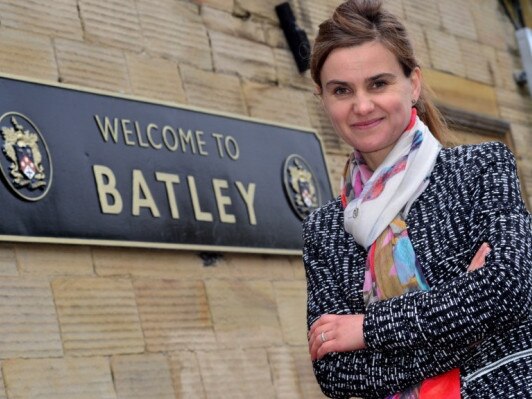
The National Police Chiefs’ Council said it is urging candidates not to campaign alone if possible and to contact local police in advance of campaigning in specific areas.
It also advised candidates to check that any material they have posted online does not release “sensitive personal information,” data that could possibly aid stalkers or those with malign intentions.
Chairman Martin Hewitt said all police forces will offer security briefings for candidates and will have a senior police officer responsible for handling safety issues.
“We’re not going to tell anyone to limit their campaigning or enthusiasm in any way, but we are taking precautionary steps ourselves and providing sensible advice to candidates,” he said.

The advice will be distributed to all candidates as part of an information package developed by police, the Electoral Commission and prosecutors.
It also suggests that candidates “take active steps around personal safety to keep themselves and their campaign staff safe” and make sure that someone knows where they are canvassing voters for support.
Police say candidates should keep a record of any intimidating behavior or abuse they encounter.
The advice stops short of suggesting that candidates avoid knocking on doors after dark, given that the extremely rare December election is taking place during the darkest time of the year.
BREXIT PARTY REJECTS DEAL
Britain’s Brexit Party has rejected an electoral pact with the ruling Conservatives, saying it will field 300 candidates in next month’s election to force Prime Minister Boris Johnson to deliver on promises of a clean break with the European Union.
Brexit Party leader Nigel Farage said the party had to contest the seats to keep pressure on Mr Johnson, rebuffing Conservative arguments that doing so risks splitting the pro-Brexit vote and helping parties that want to remain in the EU.
His comments came on the final day for candidates to register for the December 12 election. “What we’ve got so far in this campaign is for Boris to promise to change direction, what we now have to do is to hold him to account to make sure we get a proper Brexit, and that’s my job,” Mr Farage said.
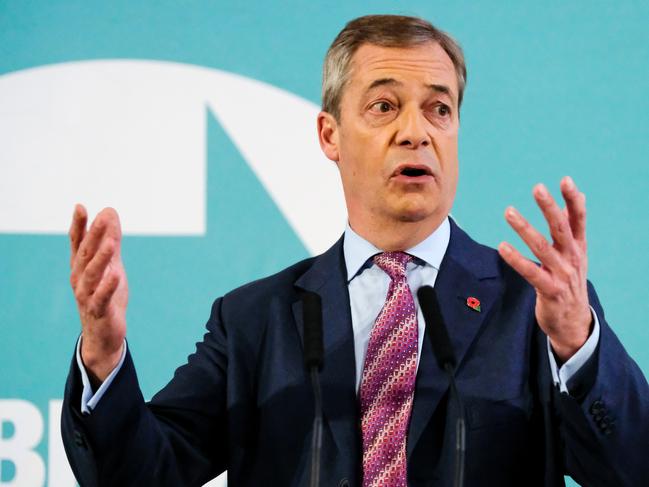
Britain is holding a national election on December 12 because Mr Johnson wants to security a majority so he can take the UK out of the bloc by the next Brexit deadline of January 31.
All 650 seats in the House of Commons are up for grabs.
Mr Johnson has reached a Brexit deal with the EU but has not persuaded enough British lawmakers to pass it.
The single-issue Brexit Party, meanwhile, prefers to leave the EU without a deal.
The Brexit Party earlier this week agreed not to run candidates 317 parliamentary seats currently held by Conservative lawmakers after Mr Johnson pledged there would be no further extension of the Brexit deadline.
But the Daily Telegraph reported that Mr Farage rejected a last-minute strategic offer from the Conservatives to only put up token opposition in 40 key seats if the Brexit Party would stand aside in other constituencies.
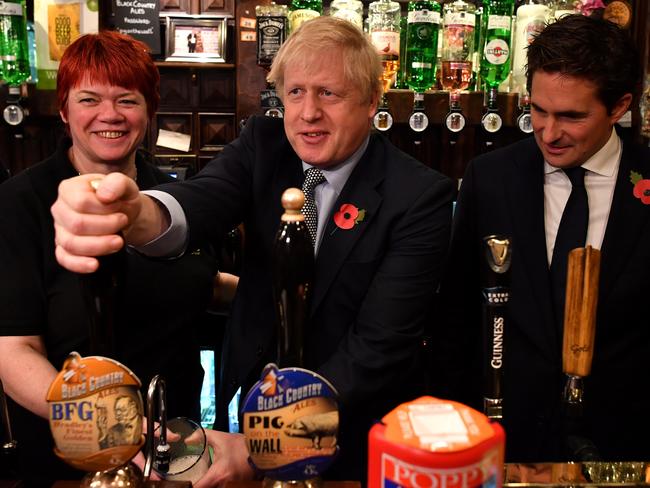
Currently the Conservatives have 298 seats and the opposition Labour Party has 243.
Analysts say to get a majority the Conservatives need to flip Labour seats in the north and east.
Mr Farage noted that “there are very clearly seats in which we are the lead challenger and there are other seats in which they (the Conservatives) are the lead challenger to Labour.”
“We could have done a deal on that basis, but the priority for the Conservative Party, they do not want the Brexit Party to get seats in Parliament,” Mr Farage said. “They’d rather risk not winning the election than having a Leave majority, a Leave alliance.”
The Conservatives fear that voter support for Mr Farage’s party could prevent them from winning some closely contested seats, robbing the party of an overall majority in the House of Commons.
Three smaller parties - the Liberal Democrats, the Greens and the Welsh-based Plaid Cymru - have already announced an electoral pact to increase the chances of electing politicians who support remaining in the EU.
The parties will throw their support behind whichever anti-Brexit candidate in certain districts is the strongest.

The Labour Party, which promises a second referendum on any Brexit deal, has refused to join the so-called Remain coalition.
The party’s hopes of forming a government may hinge on the Scottish National Party, which is against Brexit but has said it won’t support Labour unless Labour promises to allow another referendum on Scottish independence if Labour wins in December.
Mr Johnson on Wednesday used a speech at a car plant to urge voters to back his Conservatives or face a “delay and dither” coalition led by Labour’s Jeremy Corbyn and the SNP’s Nicola Sturgeon.
UK ECONOMY SLOWS BUT AVOIDS RECESSION
It comes as the British economy avoided falling into recession in the third quarter of the year, but annual growth is running at a near-decade low rate as a result of ongoing uncertainty related to Britain’s departure from the European Union and a subdued global backdrop, official figures showed on Monday.
The Office for National Statistics said that the economy grew by a quarterly rate of 0.3 per cent. That increase was solely due to a firm pick-up in July, as August and September showed monthly declines.
Following the 0.2 per cent contraction in the second quarter, there had been fears that the British economy would fall into recession – commonly defined as two consecutive quarters of negative growth.
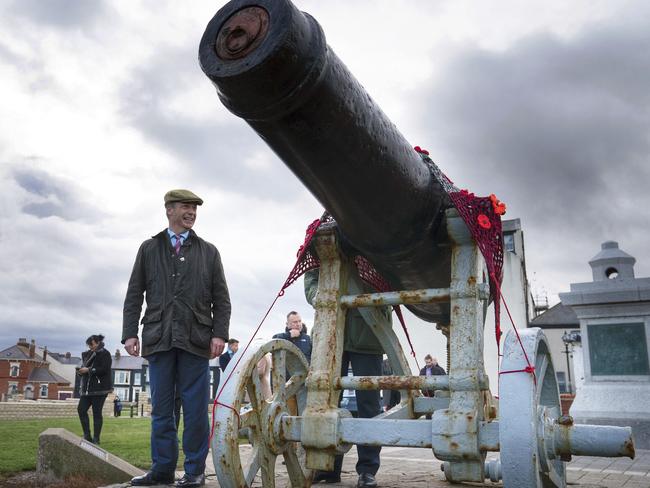
Though a recession was avoided largely because of resilient household spending and higher government spending, the British economy remains relatively weak, largely because of uncertainty related to Brexit, which is particularly impacting on business investment. On an annual basis, the British economy was only 1 per cent bigger in the third quarter, its weakest year-on-year growth since the first quarter of 2010, when Britain was emerging from a deep recession in the aftermath of the global financial crisis.
With the global economy slowing and Brexit uncertainty still prevalent in the run-up to Britain’s general election on December 12, few economists anticipate any marked improvement in the British economic outlook in the fourth quarter or even next year.
“The slowdown highlights the pains of political uncertainties linked to Brexit and the upcoming general election,” said Kallum Pickering, senior economist at Berenberg Bank.
And it’s by no means clear that the election will provide clarity over Brexit. More political gridlock could emerge.
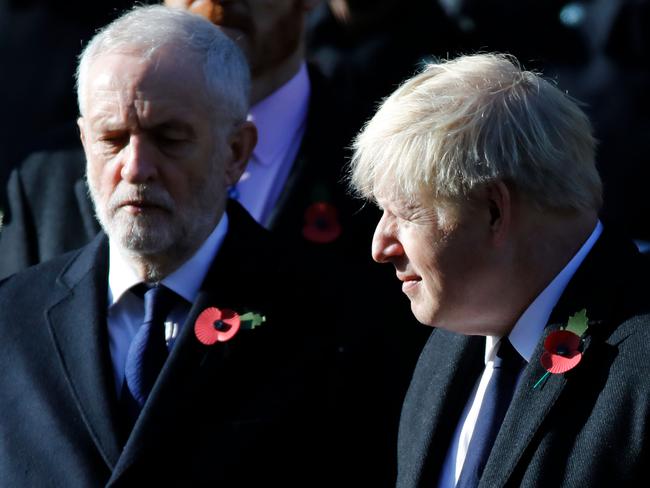
Mr Johnson hopes his Conservative Party can muster a majority to push through his withdrawal agreement to facilitate an orderly British exit from the European Union at the end of January, Britain’s new scheduled departure date. He says “getting Brexit done” will unleash pent-up investment.
Britain’s Treasury chief Sajid Javid said in a tweet that the return to growth was “another welcome sign fundamentals of UK economy are strong.”
That view was derided by his counterpart in the main opposition Labour Party, John McDonnell. “The fact that the Government will be celebrating 0.1 per cent growth in the last six months is a sign of how low their hopes and expectations for our economy are,” he said.
On Brexit, Labour wants to renegotiate Mr Johnson’s deal to ensure closer ties and then put it to the people in another referendum, with an option to remain in the EU. Most of the other opposition parties are opposed to Brexit.
MORE NEWS
Troops on standby amid bushfire crisis
NRL star Fifita released from Bali lockup
Cop shoots protester in chilling livestream
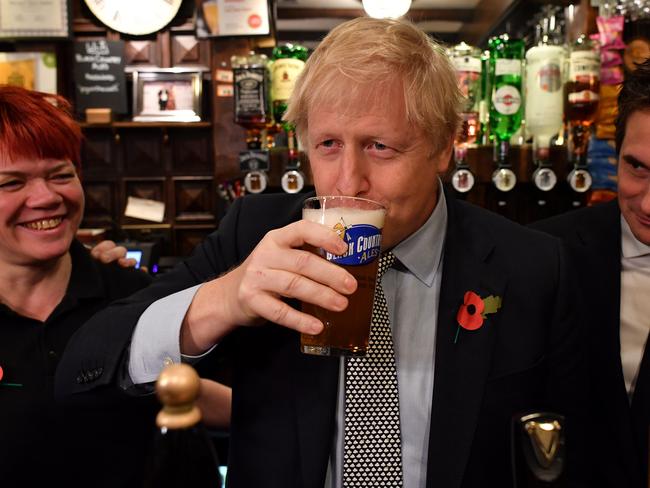
JOHNSON’S NO GROG PLEDGE SLIPPING
Meanwhile, the British PM’s pledge to give up the booze until “we get Brexit done” does not seem to be going so well.
Over the weekend, Mr Johnson downed a pint of beer at the Lynch Gate Tavern in Wolverhampton, central England while on the campaign trail.
Last week he was seen sipping whisky during a distillery visit in Scotland, casting doubt on his commitment to the alcohol ban.
Mr Johnson’s apparent “do or dry” pledge two weeks ago followed his failure to keep his “do or die” promise to deliver Britain’s withdrawal from the European Union by October 31.
He had revealed his no-alcohol pledge while chatting about health matters with nurses at a hospital in the English county of Nottinghamshire. Mr Johnson discussed smoking trends in the district before moving to the topic of alcohol.
“I’ve had to give it up until we get Brexit done,” he said.
The prime minister did not clarify whether he meant the first phase of Brexit by the end of January 2020 or the end of the transition period in December next year – or what would happen if the UK remained in the EU.

stephen.drill@news.co.uk
Originally published as UK Police unveil plan to keep politicians safe during the hostile election campaign
